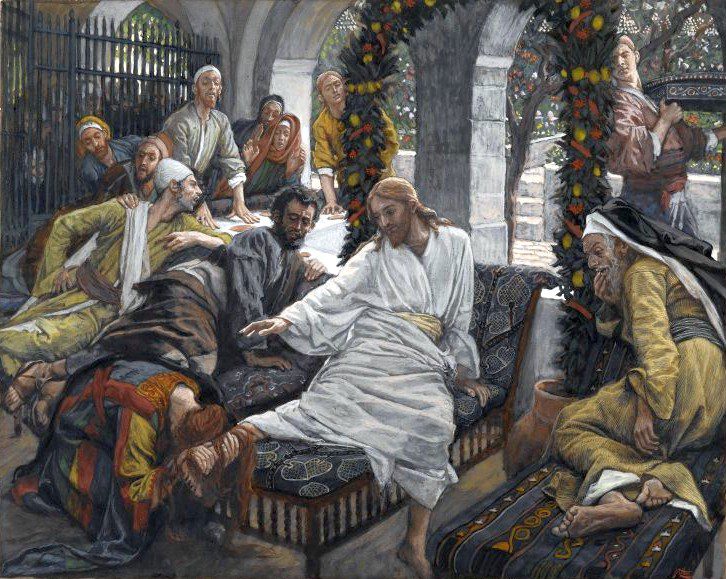
John 12:1-8 is a fitting text to consider for this Sunday in Lent. The text narrates Mary’s anointing of Jesus for burial with an extremely expensive perfume made of pure nard. Only a few verses separate Jesus’ anointing in Bethany at Mary’s, Martha’s and Lazarus’s home and Jesus’ triumphant entry into Jerusalem. We honor Jesus’ triumphant entry next week on Palm Sunday. What we find here in Jesus’ anointing is the equivalent of Lenten excess or extravagance:
Six days before the Passover, Jesus therefore came to Bethany, where Lazarus was, whom Jesus had raised from the dead. So they gave a dinner for him there. Martha served, and Lazarus was one of those reclining with him at table. Mary therefore took a pound of expensive ointment made from pure nard, and anointed the feet of Jesus and wiped his feet with her hair. The house was filled with the fragrance of the perfume. But Judas Iscariot, one of his disciples (he who was about to betray him), said, “Why was this ointment not sold for three hundred denarii and given to the poor?” He said this, not because he cared about the poor, but because he was a thief, and having charge of the moneybag he used to help himself to what was put into it. Jesus said, “Leave her alone, so that she may keep it for the day of my burial. For the poor you always have with you, but you do not always have me” (John 12:1-8; ESV).
Mary’s anointing of Jesus with such expensive perfume may lead one to think the text does not fit Lent. After all, rarely if ever does one find Lent and excess or extravagance in the same sentence, except by contrast. Why is that? Lent is a season in the Christian liturgical calendar that is intended to prepare Jesus’ followers for Easter through reflection, prayer and fasting, just as Jesus prayed, meditated and fasted in the wilderness prior to beginning his public ministry.
Here is a helpful explanation of Lent, which also serves to highlight the tension in making a connection between Lent and excess or extravagance: “Lent is a time of repentance, fasting and preparation for the coming of Easter. It is a time of self-examination and reflection. In the early church, Lent was a time to prepare new converts for baptism. Today, Christians focus on their relationship with God, often choosing to give up something or to volunteer and give of themselves for others.”
If Judas were around today, he would most likely take issue with equating excess and Lent, since in this biblical account, he takes issue with Mary anointing Jesus with nard. His stated reason is that the perfume could be sold so that the money could be spent on the poor. The text informs us that he does not care for the poor. Nor does he care for Jesus, as he will soon betray him for silver (See Matthew 26:14-16). What Judas does care about is confiscating the money and pocketing it. He was responsible for the moneybag and would often help himself to what was in it (John 12:6). Jesus rebukes Judas, making clear that while they can always give to the poor, they will not always be able to prepare him for burial, which Judas will help to expedite in betraying Jesus to his enemies (John 18:1-3).
As an aside, I wonder if Martha also took issue with Mary here. Luke’s Gospel narrates another time when Jesus is in their home and Mary is at his feet listening to him teach along with his disciples. Martha rebukes Mary for not helping her with serving. Jesus gently rebukes Martha, stating that Mary has chosen well whereas Martha is “distracted with much serving” (Luke 10:40; ESV; see Luke 10:38-42). Certainly, Martha loves Jesus, as did Lazarus their brother. But Mary is found in both Luke’s and John’s accounts given to pure, undistracted devotion. Such pure devotion is a rare find, like the perfume made of pure nard.
Certainly, Lent is a season marked by self-examination, restraint, and self-sacrifice. Such sacrifice is on display here, as Mary does not keep the perfume for herself, or sell it and spend it on herself. Rather, she pours it out on Jesus. For his part, the Lord is not gloating over this act of extravagance, or caught up in self-adulation. This anointing is to prepare him for his ultimate act of self-sacrifice, as the text informs us—his burial following death on the cross (John 12:7).
A footnote in the text informs us that a denarius was the equivalent of a laborer’s day’s wage. So 300 denarii is approximately a year’s wages. Perhaps Mary has saved up for years to buy this perfume. Or perhaps someone had given it to the family in view of the death of Lazarus, whom Jesus had raised back to life (John 12:1). Lazarus’ death and resurrection serves as a sign of Jesus’ death and resurrection to follow. Lazarus’ resurrection was the last straw for Jesus’ enemies, since many people came to believe on Jesus through it. They now sought to kill Lazarus as well, to do away with the evidence of Jesus’ miraculous power and true identity (See John 12:9-11).
This is not the first time Mary had poured perfume on Jesus. John chapter 11:2 tells us that she had earlier done the same thing—poured perfume on Jesus and wiped his feet with her hair (compare with John 12:3). Some claim that Mary is the sinful woman who poured perfume on Jesus’ feet and wiped them with her hair in a Pharisee’s house out of deep gratitude for Jesus having forgiven her of her sins (See Luke 7:36-50). Whatever the case, we can take from this account and the one in John 11 that Mary loves Jesus purely, as dignified by the perfume made of pure nard. This act of extravagant devotion and personal sacrifice of resources prepares Jesus for his ultimate sacrifice. So it is fitting that we recount this story at Lent prior to Jesus’ week of passion that follows the triumphant entry into Jerusalem, which we celebrate next week.
Today, this week, God’s Spirit may prompt us in pure devotion from a grateful heart to give extravagantly to the Lord Jesus in personal self-sacrifice, like Mary. Perhaps we have experienced the equivalent of the Lord raising our brother from the dead, like Lazarus (See John 11), or the Lord forgiving us our many sins like the woman often associated with Mary (See Luke 7). Since Jesus was anointed for burial so long ago by Mary, and given that he was raised from the dead to die no more, we can give to Jesus by giving to the poor this Lenten season, since they are still with us, as Jesus said (John 12:8).
Perhaps if we are miserly in our presumed devotion to Jesus, we will be miserly in our care for the poor. If we are extravagant in responding to Jesus’ superlatively extravagant and unsurpassed grace, we will respond in kind toward those in need around us during Lent and beyond. In reflecting on Jesus’ statement about his impending departure from his disciples and the ongoing presence of the poor, one commentator on this passage argues, “This does not mean that the poor are not important. On the contrary, Jesus establishes a parallel between himself and the poor. Now he is present, and Mary rightly feels the need to be extravagant. When he is no longer present in the flesh, the poor will still be there—to be served with the same extravagance.”
Those who are forgiven much love much. Those who are given much renounce much in gratitude, not from guilt or grudging obligation, for the sake of others in Lenten excess and extravagance.












